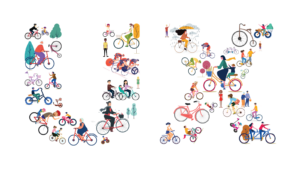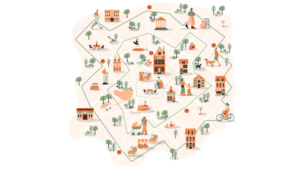E-courses on Mobility for All
Putting the user at the centre: equality, diversity and accessibility in transport.
It involves mobility for vulnerable groups, equal mobility, people with reduced mobility, social inclusion, accessibility, affordability, user-centric mobility, diversity, women in mobility, etc.

Sustainable Urban Mobility Plans (SUMPs) – Updated
Discover Sustainable Urban Mobility Plans (SUMPs). Understand their importance, components, and engagement strategies, equipping yourself to shape sustainable cities.

User Experience for Inclusive Cycling in Cities
The course introduces user experience (UX) as a tool for making cycling inclusive, and gives you methods to rethink cycling infrastructure in terms of the end user.

±15-Minute Cities: Putting People’s Needs First
Discover the truth behind 15-minute cities: their meaning, impact, and potential. Learn how this human-centered approach to urban planning fosters sustainability. Equip yourself with the tools to implement this concept and shape better cities.

Insights into gender differences in urban transport
This course allows you to better understand structural gender differences in Urban Mobility.

Active mobility at the heart of transport modelling
In this course, we will talk about the importance of placing active mobility at the same level as motorised transport.

Fundamentals of Urban Mobility
An introduction to the core concepts of urban mobility and urban transport planning to facilitate better, more liveable future cities.

Sustainable Parking Management
This course will give you an introductory understanding of what constitutes sustainable and effective parking management in cities.

Demand Responsive Transport (DRT): Where does it fit?
Discover how Demand Responsive Transport (DRT) can fit in your city and revolutionise accessibility by exploring a flexible transportation system that adapts to the needs of passengers in real-time.

Superblocks: rethinking cities and urban spaces for citizens (updated)
Superblocks have revolutionised accessibility in Barcelona. Join this short course to discover this cost-effective solution and why not, unlocking its secrets for your own neighbourood…

Urban Mobility: Accessibility for ALL
This course looks at tools and methods that deliver urban mobility in the context of universal design. How can we deliver urban mobility for everyone?
Explore courses on all categories
Explore courses on all categories

Protected: Test Course – Accessibility
Discover the truth behind 15-minute cities: their meaning, impact, and potential. Learn how this human-centered approach to urban planning fosters sustainability. Equip yourself with the tools to implement this concept and shape better cities.

Autonomous Vehicles: An opportunity for Cities
Explore the transformative impact of Autonomous Vehicles (AVs) on cities: addressing promises, skepticism, and delving into essential requirements for their deployment to shape the city of tomorrow.

Cycling Insights: Lessons from Europe
This course will help you to grasp cycling’s societal context and urban design impact, and envision an ideal future cycling environment.

Sustainable Urban Mobility Plans (SUMPs) – Updated
Discover Sustainable Urban Mobility Plans (SUMPs). Understand their importance, components, and engagement strategies, equipping yourself to shape sustainable cities.

Flexible Curbside Management (updated)
New mobility services, increasing freight and evolving mobility behaviours also affect the way we use the curb in cities. Join our course to learn more about how the curb can be managed in a flexible way and adapted to current needs in cities!

Superblocks: rethinking cities and urban spaces for citizens (updated)
Superblocks have revolutionised accessibility in Barcelona. Join this short course to discover this cost-effective solution and why not, unlocking its secrets for your own neighbourood…

The power of Mobility Data: Discover how every move matters
Explore the world of mobility data and learn about how vital it is for mobility in cities, while understanding it’s advantages and limitations. Join us on this data-driven journey to optimise movement in our urban spaces.

Demand Responsive Transport (DRT): Where does it fit?
Discover how Demand Responsive Transport (DRT) can fit in your city and revolutionise accessibility by exploring a flexible transportation system that adapts to the needs of passengers in real-time.

